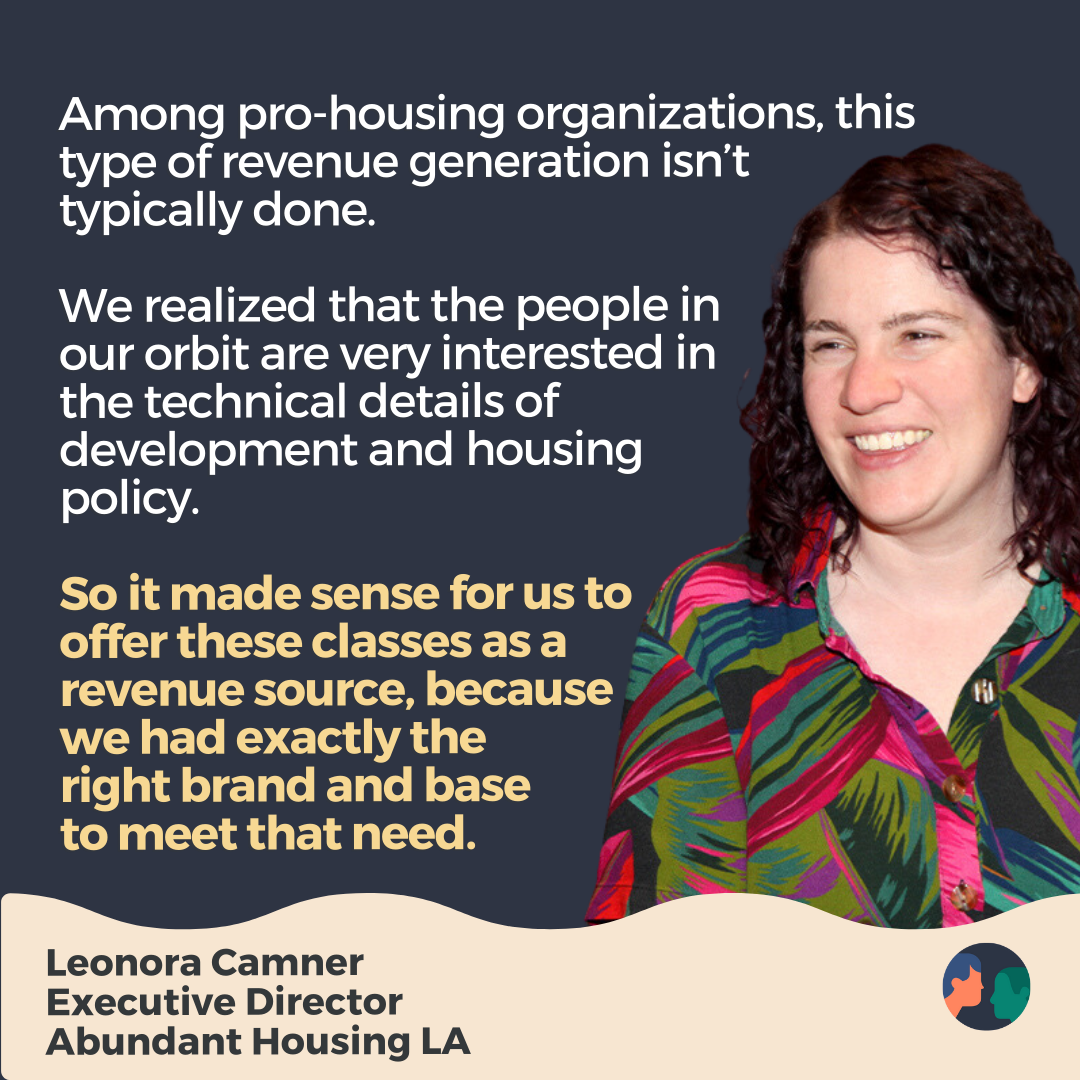Abundant Housing LA:
Fee-Based Certification Course
Overview
Abundant Housing LA (AHLA) developed a comprehensive certification program to educate participants on housing development, land use, equity in policy, and architecture while generating independent revenue to support their advocacy work. This initiative represents an innovative approach to financial sustainability for mission-driven organizations, creating a revenue stream that aligns with organizational values while expanding impact.
AHLA's certification program demonstrates how advocacy organizations can leverage their expertise to create educational offerings that both advance their mission and generate sustainable income. By designing a curriculum that transforms participants into more effective housing advocates, AHLA strengthened their movement while developing financial independence.

Program Design & Structure
AHLA’s advocacy expertise helped make complex housing topics accessible, creating value for participants seeking to navigate policy discussions and development processes.
The certification program consists of 12 classes organized into three modules:
- Development/Land Use: Covering project proposals, approval processes, financial management, and streamlining strategies
- Equity in Policy: Addressing housing's relationship to racial justice, affordable housing policy, and fair housing principles
- Architecture & Urban Design: Exploring design phases, transit access, accessibility, and integrating projects into urban contexts
Classes were delivered virtually via Zoom with recordings available for participants who couldn't attend live sessions. AHLA utilized the Teachable platform to create a structured learning environment with supplemental materials and resources.
AHLA recruited expert instructors from their extensive network, including academics, developers, architects, and policy specialists. This approach leveraged existing relationships while providing participants access to real-world expertise across the housing sector.

Revenue Model
Sales
The program's revenue structure balanced accessibility with financial sustainability—base pricing for a full course was set at approximately $1,200 per student. Tiered Pricing and need-based scholarships were provided to AHLA members, nonprofits, staff, and rent-burdened individuals.

Sponsorships
In addition to individual sales, AHLA also sold sponsorships that allowed them to ensure the accessibility of the program without sacrificing revenue. Notably, the sponsorship model allowed developers to support the program through scholarships without compromising AHLA's independence, as the organization does not accept direct donations from developers.

Overall, AHLA raised $44,000 in gross sales, sponsorships, and donations within the grant period, resulting in a 0.77 ROI within the grant period. As program expenses were quite low, requiring only small investments in tech (Teachable) and staff time, most of the revenue went straight to AHLA's c4 general program budget.
AHLA projected a 25% growth year over year from this revenue stream, resulting in a Multiplier Effect of $260,000 in projected gross sales with a 9.4 ROI over 36 months.

Implementation & Marketing





AHLA's implementation timeline spanned from July 2022 (grant period start) through June 2023, with strategic promotional pushes around enrollment periods and discount offerings. They implemented a phased marketing approach, including:
- Early bird discounts for general public and special member pricing
- Flash sales and seasonal promotions (Black Friday, holiday discounts)
- Organic social media promotion and targeted email campaigns
- Testimonials from program graduates
- Outreach to professional associations and academic institutions
AHLA faced challenges with digital advertising, as Meta classified their "Housing Policy Certification" ads under restricted categories. This limitation forced them to rely more heavily on organic reach, email marketing, and relationship-based outreach. AHLA engaged in some A/B testing and found that their carousel with participant testimonials outperformed other social posts.
Results & Impact
While the program fell short of its ambitious initial goal of certifying 150 participants, the first cohort included 38 graduates who reported significant benefits:
- Increased confidence in navigating housing issues and policy discussions
- Enhanced ability to advocate for equitable housing policies
- Practical skills in analyzing development proposals and zoning regulations
- Expanded professional networks within the housing sector
Several graduates became AHLA members and continued to advocate for fairer, more equitable housing in their communities, transforming participants into informed advocates who could apply their knowledge in professional settings and community advocacy.
The program also strengthened AHLA's internal capacity by:
- Generating unrestricted c4 revenue for operational & legal expenses
- Creating a pipeline for new advocates and members
- Enhancing AHLA's reputation as an educational leader in housing policy
- Opening doors to new sponsorship opportunities
- Improving AHLA’s visibility and brand
"Some participants had personal connections to homelessness and housing insecurity; others had dropped out of urban planning masters programs or planned to enroll in the future.
Some were in the professional world of politics, public policy, and law, and wanted to bone up on housing in particular.
One person valued the certification aspect as a way to validate her lived experience and demonstrate expertise when talking to elected officials and staffers.”
AHLA on Participant Feedback
Challenges
Marketing Capacity
Limited resources, capacity, and expertise for consistent promotion and outreach
Staff Transitions
Personnel changes disrupted communications and marketing efforts
Data Collection
Insufficient real-time tracking of conversions, enrollment, and attendance, which prevented AHLA’s ability to make timely adjustments to the program
Goal Setting
Initial targets were set somewhat arbitrarily without market testing
Digital Advertising Restrictions
Meta's ad restrictions limited AHLA's ability to advertise
Learnings
Leverage Organizational Strengths
AHLA's extensive network and subject matter expertise were crucial assets in curriculum development and instructor recruitment.
Build on your Base
As a membership-based organization, AHLA was able to build upon their base to access target audiences through relational organizing.
Invest in Marketing
Dedicated marketing resources and expertise are essential for reaching enrollment targets and maximizing revenue potential.
Implement Robust Tracking
Real-time data collection enables responsive adjustments to marketing, pricing, and content.
Balance Mission and Revenue
Educational offerings can simultaneously advance advocacy goals and generate sustainable income when properly aligned.
Create Flexible Pricing
Tiered pricing and scholarship options ensure accessibility while maintaining financial viability.
Incorporate Practical Elements
Hands-on exercises and real-world applications significantly enhance participant engagement and satisfaction.
Blueprint for Replication
1. Identify Your Educational Niche & Survey the Landscape
Assess your organization's unique expertise and the knowledge gaps in your field. Identify competitors in the landscape and compare offerings and pricing structure. AHLA looked at programs like UCLA’s Real Estate Certification Program and considered the following factors:
Target Demographics- Who is this program geared towards?
- What is their target audience?
- Is the program virtual, in-person, or hybrid?
- Is the program more of a workshop intensive or is it more lecture heavy?
- How long does it take to complete the program?
- How much time must participants invest to successfully complete the certification?
- Who is teaching this program?
- What is the standard cost?
- Do they offer scholarships or discount pricing for nonprofits?
- Do participants apply or simply enroll?
- How competitive is the program? Are there any prerequisites?
2. Design a Comprehensive Structure
Develop a curriculum that leverages your strengths while meeting genuine market needs, balancing theoretical understanding with practical applications and skills development.
3. Leverage Your Network
Recruit expert instructors from your existing relationships, providing participants access to diverse perspectives and real-world expertise.
4. Build your Pricing Menu
Develop a tiered pricing structure that balances revenue goals with accessibility. Consider scholarships, member discounts, and sponsorship opportunities against the cost of producing the modules.
Diversify income through individual registrations, organizational sponsorships, and supplemental offerings like single-session options or recorded content.
5. Identify your Value Proposition
Identify your value proposition—what is the specific and unique value your product offers?
6. Invest in Marketing Infrastructure
Allocate sufficient resources for consistent promotion, data tracking, and audience engagement. Develop systems for measuring conversion rates and optimizing outreach.
7. Measure Impact
Track how educational programs advance your advocacy goals through participant surveys, program evaluation, and long-term engagement metrics.
Conclusion
Abundant Housing LA's certification program demonstrates how mission-driven organizations can develop sustainable revenue streams that align with and enhance their core work. By transforming their advocacy expertise into valuable educational content, AHLA created a program that simultaneously generates income, builds movement capacity, and advances housing equity goals.
While the initiative faced implementation challenges, particularly around marketing and data tracking, it successfully established a foundation for financial sustainability while expanding AHLA's impact. The program's ability to transform participants into more effective advocates while generating unrestricted revenue represents a powerful model for progressive organizations seeking greater financial independence.
About Abundant House LA
Abundant Housing LA is dedicated to making Los Angeles County a more affordable, diverse, and vibrant region where everyone can afford a place to live. They view land use and zoning as tools to increase racial and economic equity, growth, sustainability, and quality of life.




